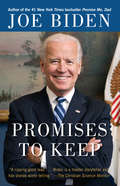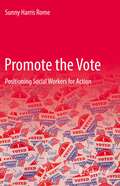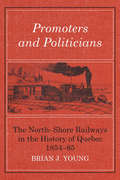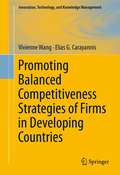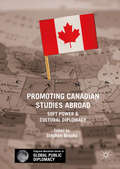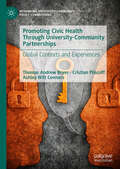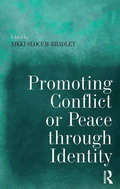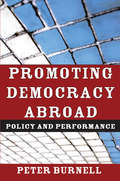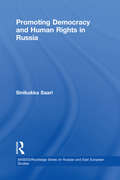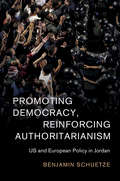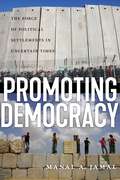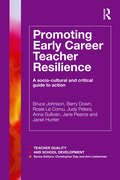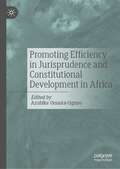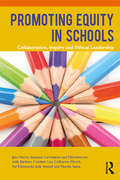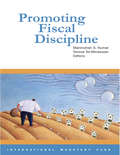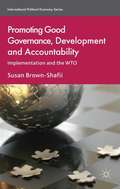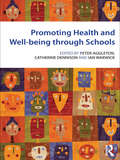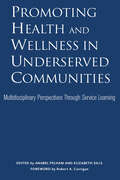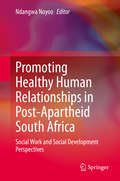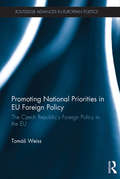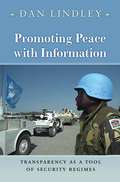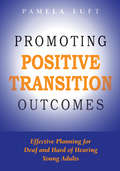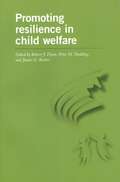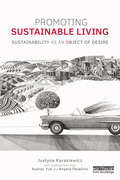- Table View
- List View
Promises to Keep: On Life and Politics
by Joe Biden"Nearly forty years after I first got involved, I remain captivated by the possibilities of politics and public service. In fact, I believe that my chosen profession is a noble calling. That's why I wanted to be a part of it."-Joe BidenAs a United States senator from Delaware since 1973, Joe Biden has been an intimate witness to the major events of the past four decades and a relentless actor in trying to shape recent American history. He has seen up close the tragic mistake of the Vietnam War, the Watergate and Iran-contra scandals, the fall of the Berlin Wall, the reunification of Germany, the disintegration of the Soviet Union, the aftermath of the 9/11 attacks, a presidential impeachment, a presidential resignation, and a presidential election decided by the Supreme Court. He's observed Nixon, Ford, Carter, Reagan, Clinton, and two Bushes wrestling with the presidency; he's traveled to war zones in Europe, the Middle East, and Africa and seen firsthand the devastation of genocide. He played a vital role by standing up to Ronald Reagan's effort to seat Judge Robert Bork on the Supreme Court, fighting for legislation that protects women against domestic violence, and galvanizing America's response (and the world's) to Slobodan Milosevic's genocidal march in the Balkans. In Promises to Keep, Biden reveals what these experiences taught him about himself, his colleagues, and the institutions of government.With his customary candor, Biden movingly recounts growing up in a staunchly Catholic multigenerational household in Scranton, Pennsylvania, and Wilmington, Delaware; overcoming a demoralizing stutter; marriage, fatherhood, and the tragic death of his wife Neilia and infant daughter Naomi; remarriage and re-forming a family with his second wife, Jill; success and failure in the Senate and on the campaign trail; two life-threatening aneurysms; his relations with fellow lawmakers on both sides of the aisle; and his leadership of powerful Senate committees.Through these and other recollections, Biden shows us how the guiding principles he learned early in life-the obligation to work to make people's lives better, to honor family and faith, to get up and do the right thing no matter how hard you've been knocked down, to be honest and straightforward, and, above all, to keep your promises-are the foundations on which he has based his life's work as husband, father, and public servant. Promises to Keep is the story of a man who faced down personal challenges and tragedy to become one of our most effective leaders. It is also an intimate series of reflections from a public servant who refuses to be cynical about political leadership, and a testament to the promise of the United States.From the Hardcover edition.
Promote the Vote: Positioning Social Workers for Action
by Sunny Harris RomeThis timely, relevant text is a comprehensive compendium of critical information about voting in the United States. It frames voting as an integral aspect of social work practice and provides concrete suggestions for how students can increase their involvement in expanding voter participation by marginalized groups.This book:Examines the current social and political context Introduces multiple perspectives on why voting mattersPresents a brief history of voting rights in the United StatesExplains the nuts and bolts of campaigns and electionsDiscusses who votes and who doesn’t, how people vote, and whyDescribes voter suppression tactics and identifies obstacles facing low-turnout groupsHighlights strategies to expand voter participationProvides concrete examples of how students can help maximize voter participationExplores how voter engagement intersects with social work at all levels of professional practiceThe only social work textbook devoted entirely to the topic of voting, Promote the Vote: Positioning Social Workers for Action is the ideal supplement for classes in social welfare policy, policy practice, human rights, and social justice. Filled with research findings, practical information, and case examples, this book provides social work students and professionals with the knowledge, strategies, and tools to engage clients and their communities in the electoral process. With voting rights quickly becoming a flashpoint in the struggle for equity and justice, now is the perfect time for this valuable resource.
Promoters and Politicians: The North-Shore Railways in the History of Quebec 1854-85 (The Royal Society of Canada Special Publications)
by Brian YoungThe history of the north-shore railways provides a case study in the complexities of industrial development in nineteenth-century Quebec. Constructed in the fifteen years following Confederation, the North Shore and the Montreal Colonization Railways reinforced Quebec's integration into a transcontinental unit. Yet bankruptcy of both companies in 1875 forced the provincial government to assume ownership of the railways and to shoulder a financial burden that kept the province preoccupied, weak, and subservient to Ottawa. Diverse political, clerical, and business interests united to construct the railways and to manoeuvre them from private companies into a public venture and ultimately into the Canadian Pacific system.The two railways brought new concentrations of capital and power that cut across French and English ethnic lines and sharpened regional rivalries. Along the south short of the St. Lawrence both French- and English-speaking inhabitants protested against the province's commitments to its north-shore railways. By the late 1870s Quebec City's English community was lobbying hard against the growing power of their English-speaking counterparts in Montreal. The north-shore railways plagued a generation of Quebec politicians, and their construction bared incompatible regional aspirations. By 1885 years of negotiation, scandal, and political blackmail culminated in the incorporation of the two north-shore railways into the Canadian Pacific system. As this study so clearly demonstrates, Quebec paid a high price in making its contribution to linking Canada by steel a mari usque ad mare.
Promoting Balanced Competitiveness Strategies of Firms in Developing Countries
by Elias G. Carayannis Vivienne W WangSince the pioneering work of Joseph Schumpeter (1942), it has been assumed that innovations typically play a key role in firms' competitiveness. This assumption has been applied to firms in both developed and developing countries. However, the innovative capacities and business environments of firms in developing countries are fundamentally different from those in developed countries. It stands to reason that innovation and competitiveness models based on developed countries may not apply to developing countries. In this volume, Vivienne Wang and Elias G. Carayannis apply both theoretical approaches and empirical analysis to explore the dynamics of innovation in developing countries, with a particular emphasis on R&D in manufacturing firms. In so doing, they present an alternative to Michael Porter's Competitive Advantage Model--a Competitive Position Model that focuses on incremental and adaptive innovations that are more appropriate than radical innovations for developing countries. Their research addresses such questions as: Do innovations advance the competitive positions of manufacturing firms in developing countries? Does the pace of innovation matter, in particular, in socio-economic and socio-political contexts?To what degree can national innovation systems and policies influence development?To what extent do a firm's innovation commitments correlate with the protection of intellectual property rights?What roles do foreign direct investment and relationships with clusters and networks play?The resulting analysis not only challenges traditional theoretical approaches to innovation, but provides suggestions for improving business practice and policymaking.
Promoting Canadian Studies Abroad: Soft Power and Cultural Diplomacy (Palgrave Macmillan Series in Global Public Diplomacy)
by Stephen BrooksThis volume examines the history and current state of Canadian studies in a number of countries and regions across the world, including Canada's major trading partners. From the mid-1980s until 2012, Canadian studies was seen as an important tool of soft power, increasing awareness of Canadian culture, institutions and history. The abrupt termination in 2012 of the Canadian government's financial support for these activities triggered a debate that is still ongoing about the benefits that may have flowed from this support and whether the decision should be reversed. The contributors to this book focus on the process whereby Canadian studies became institutionalized in their respective countries and on the balance between what might be described as Canadian studies for its own sake versus Canadian studies as a deliberate instrument of cultural diplomacy.
Promoting Civic Health Through University-Community Partnerships: Global Contexts and Experiences (Rethinking University-Community Policy Connections)
by Thomas Andrew Bryer Cristian Pliscoff Ashley Wilt Connors“In their comparative analysis of several universities from different parts of the world, the authors make a case for the critical roles that higher education institutions can play in building the civic framework in a society.”—Kyle Farmbry, Professor, School of Public Affairs and Administration, Rutgers University-Newark, United States“By defining community, discussing how universities are often contested spaces, and covering how universities and students engage their communities, the authors make the case for the future university as one that facilitates civic health.”—William Hatcher, Associate Professor, Augusta University, United States; Co-Editor-in-Chief, Journal of Public Affairs Education“With a rich variety of historic notions, views, projects, examples and policies, the book inspires to re-think current positioning of students, staff and academic institutions in society.”—Goos Minderman, Professor (Extraordinary), University of Stellenbosch Business School, South AfricaThis book adds to a robust dialogue about the role of higher education in society by examining the promotion of civic health through university-community partnerships and the role of intellectual leaders, scientists, philosophers, university administrators and students in shaping whole or parts of the world. Our global society faces significant social and environmental challenges. Professors and whole universities have an obligation to help address these issues; how they do so is subject to social, cultural, and institutional context. With lessons from Americans, British, Estonians, Lithuanians, Russians, South Africans and beyond, the authors describe the state of the practice and provide frameworks through which universities and people working within or in partnership with can affect change in communities and civic lives.
Promoting Conflict or Peace through Identity
by Nikki Slocum-BradleyDeveloping a solid basis for future research and training, this illuminating volume facilitates peace and mutual understanding between people by addressing a root cause of social conflicts: identity constructions. The volume encompasses eight revealing empirical case studies from regions throughout the world, conducted by experts from diverse disciplinary backgrounds. Each case study examines how identities are being constructed and used in the region, how these identities are related to borders and in what ways identity constructions foment peace or conflict. The volume summarizes insights gleaned from these studies and formulates an analytical framework for understanding the role of identity constructions in conflict or peace.
Promoting Democracy Abroad: Policy and Performance
by Peter BurnellPromoting democracy has grown from a small, little- known activity to a high-profile endeavor. It now involves academia, think tanks, and the popular media. The number of countries and organizations, inter-governmental, non-governmental, as well as governmental involved in supporting the spread of democracy is now legion. Countries touched by these efforts include a majority of all the world's states and some independent territories that are not yet fully sovereign. The definitional boundaries between promoting democracy and international advocacy and defense of human rights and "good governance" are not precise. Similarly, the concept of promoting democracy itself is not uniformly accepted. It has become a slogan that attracts both fervent support and grave condemnation. For Burnell, promoting democracy refers to a wide range of non-coercive attempts to spread democracy abroad for whatever reason. At its heart, it is political intervention in the domestic affairs of other countries that seeks to affect the distribution of power, whether by patient and non-violent involvement or more urgent action, democracy assistance projects form a core activity. Burnell holds that participation in the democracy assistance industry will continue to grow. However, the industry's progress up until now has in part been contingent on the progress of democratization itself. The slowdown that is currently happening in the advance of freedom and democracy around the world, and the strength shown by leading authoritarian or semi-authoritarian regimes, must raise questions about the outlook for democracy promotion. If democracy promotion and assistance are to be fit for the future, then the need for a broadly based, appropriately contextualized examination of the policy and the performance is greater now than at any time in the past.
Promoting Democracy and Human Rights in Russia (BASEES/Routledge Series on Russian and East European Studies)
by Sinikukka SaariEuropean regional organisations have spent significant amount of time, energy and money in supporting Russia's transition towards the western liberal-democratic model since the end of the cold war. This book explores the role the Council of Europe, European Union and Organisation for Security and Cooperation in Europe have played in Russia's post-Soviet transition in the field of human rights and democracy. The book argues that the organisations have played an important initial role in setting the reform agenda and in providing a general framework for interaction in the field of human rights and democracy. However, since the mid-1990s the impact of regional organisations has been slipping. Lately Russia has challenged the European human rights and democracy norms and now it threatens the whole framework for regional normative cooperation. Russia's attitude towards western liberal order has become more assertive and its defiance increasingly concerted even internationally. The main finding is that democracy and human rights promotion is not a one-way transference of norms like much of the theoretical literature and European practices presume. The Russian case demonstrates that the so-called target state can influence the norm promoters and the interpretation of the norms in a fundamental way. This is a finding that has significant implications both for theory and practice.
Promoting Democracy, Reinforcing Authoritarianism: US and European Policy in Jordan (Cambridge Middle East Studies #57)
by Benjamin SchuetzeAppearing against the backdrop of Jordan's remarkable levels of authoritarian stability and accounting for Jordan being one of the highest recipients of US and European 'democracy promotion' funding, Promoting Democracy, Reinforcing Authoritarianism examines what external 'democracy promoters' actually do when they promote democracy. By examining why Jordanian authoritarianism is so stable, not despite but in part because of external attempts at 'democracy promotion', Benjamin Schuetze demonstrates the depth of Orientalist attitudes among 'democracy promoters'. In highlighting the undermining of democratic values as they become circumscribed by the free market and security concerns, Schuetze suggests that although US and European policy in Jordan comes under the cloak of a universal morality which claims the surmounting of authoritarianism as its objective, its effect is not that different to traditional modes of imperial support for authoritarian regimes. As a result, this is a vivid illustration of what greater US and European policy presence in the Global South really means.
Promoting Democracy: The Force of Political Settlements in Uncertain Times
by Manal A. JamalHow Western donor assistance can both help and undermine democracy in different parts of the world Democracy promotion is a central pillar of the foreign policy of many states, but the results are often disappointing. In Promoting Democracy, Manal A. Jamal examines why these efforts succeed in some countries, but fail in others. A former journalist and researcher in the Palestinian territories, she offers an up-close perspective of the ways in which Western donor funding has, on one hand, undermined political participation in cases such as the Palestinian territories, and, on the other hand, succeeded in bolstering political engagement in cases such as El Salvador. Based on five fieldwork trips and over 150 interviews with grassroots activists, political leaders, and directors and program officers in donor agencies and NGOs, Jamal brings into focus an often-overlooked perspective: the experiences of those directly affected by this assistance. Promoting Democracy makes an important and timely argument about how political settlements ultimately shape democracy promotion efforts, and what political choices Western state sponsored donors can make to maximize successful outcomes in different contexts across the world.
Promoting Early Career Teacher Resilience: A socio-cultural and critical guide to action (Teacher Quality and School Development)
by Bruce Johnson Anna Sullivan Janet Hunter Barry Down Judy Peters Jane Pearce Rosie Le CornuIn Promoting Early Career Teacher Resilience the stories of 60 graduate teachers are documented as they grapple with some of the most persistent and protracted personal and professional struggles facing teachers today. Narratives emerge detailing feelings of frustration, disillusionment and even outrage as they struggle with the complexity, intensity and immediacy of life in schools. Other stories also surface to show exhilarating experiences, documenting the wonder, joy and excitement of working with young people for the first time. This book makes sense of these experiences in ways that can assist education systems, schools, and faculties of teacher education, as well as early career teachers themselves to develop more powerful forms of critical teacher resilience. Rejecting psychological explanations of teacher resilience, it endorses an alternative socio-cultural and critical approach to understanding teacher resilience. The book crosses physical borders and represents experiences of teachers in similar circumstances across the globe, providing researchers and teachers with real-life examples of resilience promoting policies and practices. This book is not written as an account of the failures of an education system, but rather as a provocation to help generate ideas, policies and practices capable of illuminating the experiences of early career teachers in more critical and socially just ways at an international and national level.
Promoting Efficiency in Jurisprudence and Constitutional Development in Africa
by Azubike Onuora-OgunoThis book eulogises a personality that has constructed a formidable scholarly and personal legacy that future generations of legal practitioners and socio-legal scholars in Africa should look to for guidance and inspiration. Divided into three parts, the book deals with a longstanding legal practice and scholarship on the role of international law and institutions. Additionally, the book discussed roles of an African scholar and practitioner to advance socio-economic and cultural rights across the continent, through contextualised, progressive adjudication and from a gendered perspective. Finally, the book examined the importance of early-childhood education and legal education alike, the role of the courts in redressing these concerns and the need for greater inclusion of Afro and queer-sensitive pedagogies and perspectives. Contributors to the book address the role of schools in redressing systemic marginalisation—including stigmatisation based on disability—and efforts to translate their rights as prescribed in national constitutions and international legal instruments. The methodology encompasses a TWAIL approach and the call to revisit orthodox approaches to legal scholarship.
Promoting Equity in Schools: Collaboration, Inquiry and Ethical Leadership
by Mel Ainscow Jess Harris Suzanne CarringtonAround the world, countries are searching for ways of making their schools more effective for all children and young people. This book offers a new way of thinking about how to address this challenge. It sees improvement as requiring a collective effort that involves contributions from all members of a school community. Crucial to this is the idea of ethical leadership. Promoting Equity in Schools is written by a team of academic researchers who had a most unusual opportunity to work with a network of schools over three years, experimenting to find more effective ways of including hard to reach learners. Bringing together practitioner knowledge and ideas from research carried out from a variety of perspectives, the authors provide rich accounts of what happened when the schools attempted to become more inclusive and fairer. In so doing, they throw light on the challenges this presents for school leaders. The accounts presented in the book are located in Queensland, Australia, where the school system faces significant difficulties in relation to equity that resonate with similar difficulties around the world. These difficulties relate to policies that emphasize high-stakes testing and school choice, which tend to promote increased segregation, to the particular disadvantage of young people from low income and minority backgrounds. The arguments presented suggest that even where worrying policies are in place, with leadership driven by a commitment to equity, schools can still find space to develop more equitable ways of working.
Promoting Fiscal Discipline
by International Monetary FundFiscal discipline is essential to improve and sustain economic performance, maintain macroeconomic stability, and reduce vulnerabilities. Discipline is especially important if countries, industrial as well as developing, are to successfully meet the challenges, and reap the benefits, of economic and financial globalisation. Lack of fiscal discipline generally stems from the injudicious use of policy discretion. The benefits of discretion are seen in terms of the ability of policymakers to respond to unexpected shocks, and in allowing elected political representatives to fulfill their mandates. But discretion can be misused, resulting in persistent deficits and procyclical policies, rising debt levels, and, over time, a loss in policy credibility. The authors first explore the role of discretion in fiscal policy, and the extent, consequences, and causes of procyclicality, particularly in good times. They then examine how a variety of institutional approaches - fiscal rules, fiscal responsibility laws, and fiscal agencies - can help improve fiscal discipline. While each of these approaches can play a useful role, the authors suggest that a strategy combining them is likely to be particularly beneficial. Although such a strategy requires political commitment and effective fiscal management, at the same time, the strategy itself can bolster political commitment by highlighting the restraints on government and raising the costs of failing to respect them.
Promoting Good Governance, Development and Accountability
by Susan Brown-ShafiiIn addressing the politics of the international regulation of public procurement, this book fills a major gap in the literature. Brown-Shafii does this by investigating whether a WTO Agreement can be used to promote good governance, development and accountability.
Promoting Health and Wellbeing through Schools
by Peter AggletonThe contribution schools can make to improving students’ health and wellbeing is increasingly recognised. Schools that have embraced this role and adapted policies and practices to create an environment in which young people feel safe and happy have reported broad and significant gains. Through expert contributions from active researchers and experienced practitioners, Promoting Health and Wellbeing through Schools combines recent research with knowledge of the current climate in which schools are operating. Offering authoritative advice on effective intervention, this book provides an overview of the key issues that need to be addressed, including: alcohol use sexual health drug use obesity mental health. This accessible text is innovative in its focus on how schools can build partnerships with young people, parents, and health professionals to promote their commitment to health and wellbeing. It highlights successful approaches for promoting health and educational goals, and provides useful advice on planning and evaluation. Promoting Health and Wellbeing through Schools is invaluable reading for professionals working in and with schools to implement healthy schools programmes and to bring about improvement in health and wellbeing, including teachers, nurses, and health and education managers. It is also of interest to students, researchers and policy-makers.
Promoting Health and Wellness in Underserved Communities: Multidisciplinary Perspectives Through Service Learning (Higher Education Ser.)
by Robert A. Corrigan Anabel Pelham Elizabeth SillsStarting from the premise that our health status, vulnerability to accidents and disease, and life spans – as individuals and communities – are determined by the organization, delivery, and financing (or lack thereof) of health care, this book explores how educators and community caretakers teach the complex web of inter-connection between the micro level of individual health and well-being and the macro level of larger social structures. Through the lenses of courses in anthropology, ESL, gerontology, management information systems, nursing, nutrition, psychology, public health, and sociology, the contributors offer examples of intergenerational and interdisciplinary practice, and share cutting-edge academic creativity to model how to employ community service learning to promote social change.
Promoting Healthy Human Relationships in Post-Apartheid South Africa: Social Work and Social Development Perspectives
by Ndangwa NoyooThis is the first book that examines healthy human relationships in post-apartheid South Africa. In contemporary South Africa, human relationships are under considerable threat. Despite the 1994 commitment to an inclusive and human-rights-based democracy, human relationships remain strained. Bearing in mind South Africa's tortuous and divisive past, this book brings to light many issues, prospects and challenges with regard to the promotion of healthy human relationships after apartheid ended. Social work and social development perspectives are central to the issues that are raised in this volume. The profession of social work has always championed the centrality of human relationships, being less interested in the internal functioning of people and more interested in their interpersonal functioning within broader structures and forces, including social justice, building people's strengths and capabilities, anti-discrimination, diversity and empowerment.This edited book is based on select papers presented at a social work conference in 2019 that was co-hosted by the Department of Social Development at the University of Cape Town and the Association of South African Social Work Education Institutions. In the chapters, the contributors offer some solutions to the ubiquitous societal ills that emanate from either corrosive or broken human relationships:Resurgent racism in post-apartheid South Africa and the need to promote healthy human relationshipsPromoting healthy human relationships with sub-Saharan African immigrants and South AfricansPromoting family and human relationships in a traumatised societySocial policy, social welfare, social security and legislation in promoting healthy human relationships in post-apartheid South AfricaSocial protection as a tool to promote healthy human relationships in South AfricaPromoting Healthy Human Relationships in Post-Apartheid South Africa is an essential resource for an international audience of scholars, policy-makers, and social work and social development practitioners, legislators and students.
Promoting National Priorities in EU Foreign Policy: The Czech Republic’s Foreign Policy in the EU (Routledge Advances in European Politics)
by Tomas WeissHow do smaller member states promote their interests in EU foreign policy and external relations? <P><P>EU membership can be seen to affect member states’ foreign policy in two ways, either by restricting national policies or empowering states in a challenging global environment. There is a general agreement, however, that the member states, especially smaller ones, have to engage actively in policy-making in order to promote their particular interest. <P><P> This cross-policy comparison of the behaviour of Czech Republic’s representatives in the Council and the methods they use to influence the decision-making applies categorisation from lobbying literature to analyse the behaviour of the member state’s representatives and contributes to two strands of scholarship on European Union politics - decision-making in the EU and Europeanization. The book maps the methods of interest promotion that can be used by a member state and analyses the differences in interest promotion across external policy areas.
Promoting Peace with Information: Transparency as a Tool of Security Regimes
by Dan LindleyIt is normally assumed that international security regimes such as the United Nations can reduce the risk of war by increasing transparency among adversarial nations. The more adversaries understand each other's intentions and capabilities, the thinking goes, the less likely they are to be led to war by miscalculations and unwarranted fears. But how is transparency provided, how does it actually work, and how effective is it in preserving or restoring peace? In Promoting Peace with Information, Dan Lindley provides the first scholarly answer to these important questions. Lindley rigorously examines a wide range of cases, including U.N. peacekeeping operations in Cyprus, the Golan Heights, Namibia, and Cambodia; arms-control agreements, including the Nuclear Non-Proliferation Treaty; and the historical example of the Concert of Europe, which sought to keep the peace following the defeat of Napoleon in 1815. Making nuanced arguments based on extensive use of primary sources, interviews, and field research, Lindley shows when transparency succeeds in promoting peace, and when it fails. His analysis reveals, for example, that it is surprisingly hard for U.N. buffer-zone monitors to increase transparency, yet U.N. nation-building missions have creatively used transparency to refute harmful rumors and foster democracy. For scholars, Promoting Peace with Information is a major advance into the relatively uncharted intersection of institutionalism and security studies. For policymakers, its findings will lead to wiser peacekeeping, public diplomacy, and nation building.
Promoting Positive Transition Outcomes: Effective Planning for Deaf and Hard of Hearing Young Adults
by Pamela LuftMany students struggle with the transition from high school to the next stage of their lives. For deaf and hard of hearing (DHH) students, that struggle can be intensified by barriers and discriminatory attitudes they face in their communities, schools, and workplaces. Though much progress has been made, they are often underemployed and underpaid, and they receive postsecondary training at lower rates than other disability groups. Author Pamela Luft explores the reasons for these statistics and offers strategies and resources that can improve outcomes. Promoting Positive Transition Outcomes is the most comprehensive discussion of transition planning and results for DHH students now available. Luft begins with an overview of the historical and current challenges to DHH students and their academic and vocational potential. She explores the importance of forming an identity and building foundational social and problem-solving skills. She then reviews the history of rehabilitation and workforce legislation, which now mandates that every student with an individualized education plan (IEP) have a transition plan in place by the age of 16. Most schools, however, are not equipped to meet the needs of a population as diverse as DHH students. She examines the services that are currently available in high schools and offers recommendations for strengthening transition team planning by reaching out to external experts. The volume concludes with suggestions for creating a framework to address the challenges of transition planning for deaf and hard of hearing students and offers guidance on building effective plans.
Promoting Rental Housing Affordability in European Cities: Learning from the Cases of Milan and Vienna (SpringerBriefs in Applied Sciences and Technology)
by Marco PeveriniThis book investigates policies for the promotion of housing affordability in the rental sector of attractive cities in Europe. Affordability links the housing situation to the economic situation of households, referring to conditions of access to housing and to the role of housing in determining poverty or wealth. The book examines the current affordability crisis and frames it in the ongoing process of urban restructuring and devolution of welfare. From the perspective of the Foundational Economy, the book calls for a proactive and effective role of public administrations in making the rental sector an affordable and stable alternative to housing financialization and commodification. By intertwining theory construction and real-world data collected through case studies in Milan and Vienna, the book provides an original framework for the analysis of public policies that promote rental affordability in a multi-level setting. Through the analysis, it highlights critical nodes of the different (housing, urban, and social) policy domains at stake in the promotion of rental affordability in attractive cities. The book proposes a shift from the currently dominant supply-side argument to an integrated, intersectoral and multi-scalar policy system for making cities more affordable.
Promoting Resilience in Child Welfare (Actexpress)
by Robert J. Flynn M. Peter Dudding G. James BarberAlmost twenty years ago, conceptual work began in the United Kingdom on what was to become the international Looking After Children initiative. Looking After Children has had a profound influence on child welfare in Canada and some fifteen other countries, including the UK, Australia, Sweden, and Hungary. It has sharpened the developmental focus and improved the quality of services for children and adolescents who, because of abuse, neglect, extreme poverty, or other circumstances, live in out-of-home care. With its emphasis on high expectations, positive substitute parenting, and good short-term and long-term outcomes, Looking After Children has been an important vehicle for promoting resilience in child welfare, one that will remain a beneficial influence in Canada and internationally for many years to come.
Promoting Sustainable Living: Sustainability as an Object of Desire (Routledge Studies in Sustainability)
by Audrey Yue Justyna Karakiewicz Angela PaladinoCurrent images of sustainability are often designed to instil fear and force change, not because we believe in it, but because we fear the consequences of inaction. Moving away from negative portrayals of sustainability, this book identifies the factors that motivate people to aspire towards sustainable living. It introduces the notion of sustainability as an "object of desire" that will allow people not to be scared of the future but rather to dream about it and look forward to a better quality of life. Tracing the history of major changes in our society that have dramatically altered our perceptions, beliefs and attitudes about sustainability, the book analyses the role of communications in persuading people of the benefits of sustainable living. It describes our current desires and dreams and explains why we need to change. Finally, the book suggests what could be done to not only make sustainability an object of desire, but also introduce hopes and dreams for a better future into our everyday lives. This inspiring and interdisciplinary book provides innovative insights for researchers, students and professionals in a range of disciplines, in particular environment and sustainability, sustainable marketing and advertising, and psychology.
